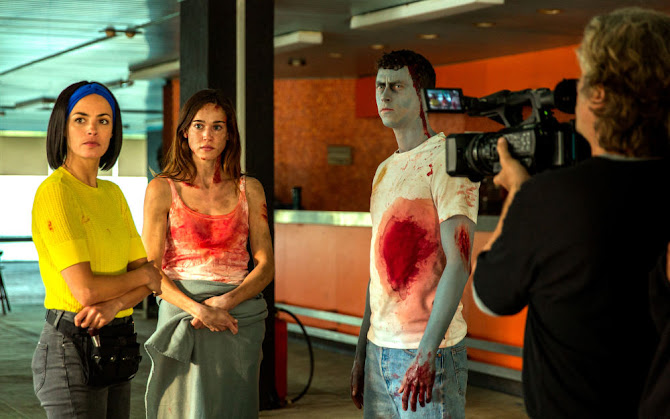Masquerade begins with a quote from Somerset Maugham: "The French Riviera is a sunny place for shady people." We later find out the house of Isabelle Adjani's truculent Martha was once owned by the author. Immediate snap to Murray Head's One Night in Bangkok: "Tea, girls, warm, sweet. Some are set up in the Somerset Maugham suite." Great lyrics, but let's move on. Writer/director Nicolas Bedos sets this tale of scammers and dupes (or pigeons) in the stunning south of France, the Riviera that Maugham was so taken with, and to be fair, the scenery competes for star billing.
Those human stars are suitably glimmering, though, as you've got Adjani alongside François Cluzet and Emmanuel Devos, on the aging side, with Marine Vacth and Pierre Niney representing the youth. All are brilliant, except Niney as the nominal lead, Adrien - he's lacking a bit of grit or charm or something. He's ok, just not quite up to the level of the others. Vacth, as Margot, is electric, especially as she's required to imitate a Brit speaking French at one point; Cluzet is excellent as Simon, a real estate agent dazzled and deceived by Margot; Adjani's Martha diva's all over the shop, in a not so subtle swipe at her usual roles and persona. There's even a scene of her watching one of her old films in nostalgic reverie, said film is used later by Adrien for a more....tumescent reason.
There's loads occurring but I'll attempt to summarise. Adrien was a dancer, possibly on the verge of success, when a motorbike accident scuppered that idea, leading him to take up whoring for older women. His current 'job' is with Martha, whose attitude towards him oscillates between amusement and contempt. Margot is servicing a client as well when she bumps into Adrien at one of Martha's parties. They become close and hatch a plan to fleece certain rich patsies. Help with this task comes in the form of one of Adrien's old customers, Julia (Laura Morante).
The story is presented in the gnarled framing device of a court case - Cluzet is on trial for attempted murder - and this is part of the problem with Masquerade. The writing is just not quite up to the setting or the cast. I don't mind being able to pick the 'twist' early on but the whole thing was bit lacklustre - there's not much sympathy to be had for anyone (except maybe Devos) and you'd be hard pressed to find much inventiveness either. It's all a little old hat.
In saying that, it's a perfectly pleasant way to spend a couple of hours, especially considering the 'shady' talent on show.
Masquerade is showing at the Alliance Francaise French Film Festival at Palace and Luna cinemas in Perth and all over the country as well.
See also:
Love Me if You Dare (Jeux d'enfants) (2003), directed by Yann Samuel, has a similar central relationship, and this may be counter-cultural, but I found myself remembering Dirty Rotten Scoundrels (1988), directed by Frank Oz.











